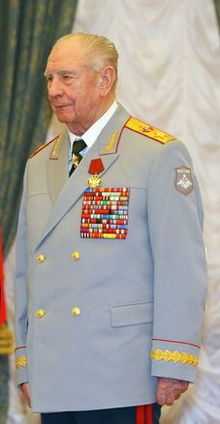Dmitry Yazov
| Dmitry Yazov Дми́трий Я́зов | |
|---|---|
 | |
| Yazov in 2009 | |
| Minister of Defence | |
| In office 30 May 1987 – 22 August 1991 | |
| Premier | Nikolai Ryzhkov Valentin Pavlov |
| Preceded by | Sergei Sokolov |
| Succeeded by | Yevgeny Shaposhnikov |
| Personal details | |
| Born | November 8, 1924 Omsk Oblast, Soviet Union |
| Nationality | Soviet/Russian |
| Other political affiliations |
Communist Party of the Soviet Union |
| Military service | |
| Allegiance | Soviet Union/Russian Federation |
| Service/branch | Soviet Army/Russian Ground Forces |
| Years of service | 1941–1993 |
| Rank | Marshal |
| Battles/wars | World War II, Soviet war in Afghanistan |
Dmitry Timofeyevich Yazov (Russian: Дми́трий Тимофе́евич Я́зов; born November 8, 1924) was the last Marshal of the Soviet Union to be appointed before the collapse of the Soviet Union (on April 28, 1990). He was the only Marshal of the Soviet Union to be born in Siberia. A veteran of the Great Patriotic War, Yazov is the last surviving Marshal and the only one not to have been awarded Hero of the Soviet Union.
In 1979–1980, Yazov was commander of the Central Group of Forces in Czechoslovakia. He was commanding the Far East Military District in the northern summer of 1986, when, according to Time magazine, he made a favourable impression on General Secretary Mikhail Gorbachev, which led to later promotions. He held the post of Soviet Defence Minister from May 1987. In 1987–1990, Yazov was a candidate for membership in Politburo. Yazov was responsible for deployment of Russian OMON commando units to Latvia and Lithuania in early 1991. During the August Coup of 1991, Yazov was a member of the State Emergency Committee, for which he was purged from his post by Gorbachev. During the Yeltsin period Yazov was prosecuted and acquitted in 1994.
Yazov spent 18 months in Matrosskaya Tishina. According to the magazine Vlast' No. 41(85) of 14 October 1991 "...from the prison contacted the President with a recorded video message, where repented and called himself "an old fool"". Yazov denies ever doing so. He did accept the amnesty offered by Yeltsin, stating that he was not guilty. He was dismissed from the military service by Presidential Order and awarded a ceremonial weapon. He was awarded an order of Honor by the President of Russian Federation. Yazov later worked as a military adviser at the General Staff Academy.
Despite his selection by Gorbachev for the Defence Minister's position, William Odom, in his book The Collapse of the Soviet Military, repeats Alexander Yakovlev's description of Yazov as a "mediocre officer", "fit to command a division but nothing higher".[1] Odom suggests Gorbachev was only looking for "careerists who would follow orders, any orders".
In popular culture
Yazov appears in Tom Clancy's Cold War espionage thriller The Cardinal of the Kremlin in his capacity as Defence Minister and the superior of the titular spy Colonel Filitov.
Honours and awards
- Order of Merit for the Fatherland 4th class (Russian Federation)
- Order of Honour (Russian Federation)
- Two Orders of Lenin
- Order of the October Revolution
- Order of the Red Banner
- Order of the Patriotic War 1st class
- Order of the Red Star
- Order for Service to the Homeland in the Armed Forces of the USSR 3rd class
- Medal "For Military Merit"
- Jubilee Medal "For MIlitary Valour – In Commemoration of the 100th Anniversary since the Birth of Vladimir Il'ich Lenin"
- Medal "For Distinction in Guarding the State Border of the USSR"
- Medal "For the Defence of Leningrad"
- Medal "For the Victory over Germany in the Great Patriotic War 1941–1945"
- Jubilee Medal "Twenty Years of Victory in the Great Patriotic War 1941–1945"
- Jubilee Medal "Thirty Years of Victory in the Great Patriotic War 1941–1945"
- Jubilee Medal "Forty Years of Victory in the Great Patriotic War 1941–1945"
- Jubilee Medal "50 Years of Victory in the Great Patriotic War 1941–1945"
- Jubilee Medal "60 Years of Victory in the Great Patriotic War 1941–1945"
- Jubilee Medal "65 Years of Victory in the Great Patriotic War 1941–1945"
- Medal "In Commemoration of the 300th Anniversary of Saint Petersburg"
- Medal "Veteran of the Armed Forces of the USSR"
- Medal "For Strengthening Military Cooperation"
- Medal "For the Development of Virgin Lands"
- Jubilee Medal "30 Years of the Soviet Army and Navy"
- Jubilee Medal "40 Years of the Armed Forces of the USSR"
- Jubilee Medal "50 Years of the Armed Forces of the USSR"
- Jubilee Medal "60 Years of the Armed Forces of the USSR"
- Jubilee Medal "70 Years of the Armed Forces of the USSR"
- Medal "In Commemoration of the 250th Anniversary of Leningrad"
- Medals "For Impeccable Service" 1st and 2nd classes
Foreign awards:
- Order of the Red Banner (Afghanistan)
- Order of "Friendship of Peoples" (Afghanistan)
- Medal "40 years Khalkhin Golskoy Victory" (Mongolia)
- Medal "50 Years of the Mongolian People's Revolution" (Mongolia)
- Scharnhorst Order (GDR)
- Medal "20 years of independence of the Republic of Kazakhstan"
- Order of Red Banner (Czechoslovak SSR)
Religious award:
- Order of St. Grand Prince Dmitry Donskoy (Russian Orthodox Church)
Sources
- ↑ Odom, 1998, p. 111
| Political offices | ||
|---|---|---|
| Preceded by Sergei Sokolov |
Minister of Defence of Soviet Union 1987–1991 |
Succeeded by Yevgeny Shaposhnikov |